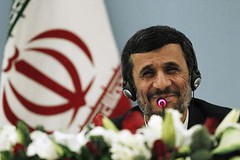
Islamic Republic of Iran President Mahmoud Ahmadinejad addresses the news media in Istanbul, Turkey at a scientific international conference. The president said that sanctions had failed to stem the progress of the middle-eastern state.
Originally uploaded by Pan-African News Wire File Photos
Dorian Jones | Istanbul24 December 2010
Iranian President Mahmoud Ahmadinejad addressed the media during a news conference in Istanbul, Turkey, 24 Dec 2010
Iranian President Mahmoud Ahmadinejad is attending an Eurasian economic conference in Istanbul where attendees committed themselves to greater economic cooperation. But such commitments come as Turkey's allies in Europe and the U.S. are looking to Ankara to support them in isolating Iran over its controversial nuclear program.
At a packed press conference Thursday, President Mahmoud Ahmadinejad declared U.S.- led attempts to stop his country from developing nuclear power a complete failure. He also said sanctions against his country were doomed to fail and went on to praise the Economic Cooperation Organization, or ECO, for offering new ways for countries in the region to develop their economies.
"Under the leadership of Turkish President Abdullah Gul we have reached an agreement to enhance and organize deeper economic cooperation," he said. The Istanbul summit will result in countries reaching a new level of economic cooperation.
Leaders and delegations from Afghanistan, Pakistan and other Central Asian countries also attended the trade bloc's summit, which aims to promote regional economic development and cooperation among member states.
Tri-national development bank
Earlier, President Gul said ECO is committed to expanding the tri-national development bank between Pakistan, Turkey and Iran.
There is a determination to establish an increase of 20 percent trade. The Eco-Trade and Development Bank, which is one of the fundamental dynamos for economic activities, has been founded. This bank has a capital of paid $230 million, and its center is in Istanbul. The partners are Turkey, Iran and Pakistan, he said.
But it remains unclear whether the bank enforces European and U.S. sanctions against Iran over its nuclear program. The United States, other Western countries and Israel fear that Iran wants to develop nuclear weapons, an allegation Tehran has steadfastly denied, saying its nuclear program is strictly for peaceful purposes.
Ankara claims it's only bound by U.N. sanctions against Iran'd nuclear program. Turkey's islamic rooted government argues that it can play an important role both as a facilitator and mediator between Tehran and Washington and Brussels.
Uneasiness
Discussions between Iran and what is known as the P5+1 - the five permanent members of the U.N. Security Council plus Germany -- are to be held in Istanbul in January.
But Ankara's deepening economic cooperation with Tehran can only add to the growing unease among it's western allies, says political scientist Soli Ozel.
"Turkey tries to be all things to all people and I think its reaching a limit," he said. "And whether or not Turkey overplays it hand or necessarily undermines the sanctions regime that is going to be more and more the question that will be raised and then at one point it will have to make a decision."
Free trade and visa free zone
Observers say decision time is also looming on another of Ankara's foreign policy initiatives: that of it developing a free trade and visa free zone with its Middle Eastern neighbors.
Already Iranians and Syrians enjoy visa free travel and Ankara has said its looking to include Iraq in the agreement. Turkish media have already compared it to the EU's border-free Schengen zone. But the rapid pace of the scheme has led to concerns that it will complicate Turkey's EU membership aspirations.
But Ergemen Bagis, Turkish minister for EU membership, dismissed such concerns. "If you are not ready to lift visas to our citizens then why are you interfering with our visa relations with other counters?," he said.
Bagis is referring to the EU's continued refusal to ease visa requirements for Turks traveling to the Europe. Turkey's bid to join the EU has come to a virtual halt due to the ongoing dispute over the divided island of Cyprus and staunch French opposition. The stagnant membership bid is in stark contrast to Turkey's rapidly developing relations with it Eastern and Middle Eastern neighbors, including Iran, which the ECO summit has brought to the forefront.
Find this article at:
http://www.voanews.com/english/news/Iran-President-Says-Nuke-Sanctions-Have-Failed-112436729.html
No comments:
Post a Comment